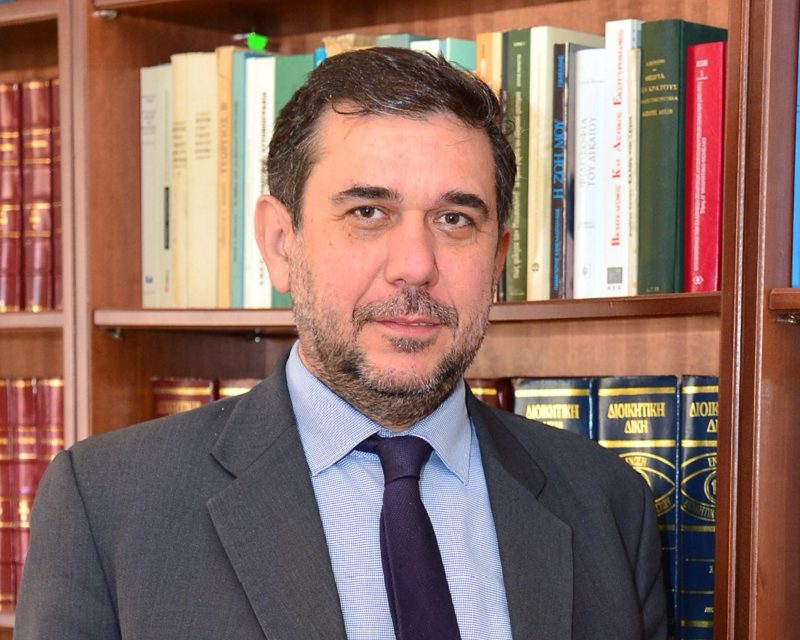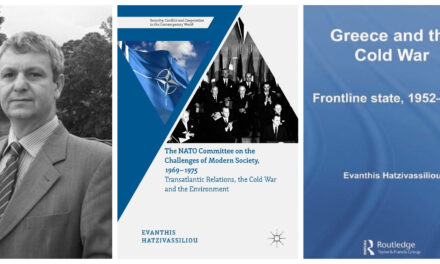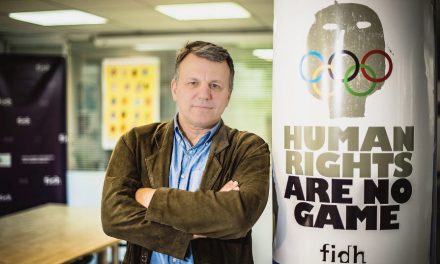Spyridon Vlachopoulos, is Professor of Public Law at Law School in the National and Kapodistrian University of Athens. His areas of interest are Constitutional Law, National and International Protection of Fundamental Rights, Political and Constitutional History et al. and he is the author of several scientific articles in the field of Public Law, especially Constitutional Law, Constitutional History Fundamental Rights, Civil and Social Rights. Since 1992 he is an attorney at Law, specialized in Public Law cases (e.g.: Protection of Fundamental Rights, Environmental Law, Public Procurement Law, Civil Servants Law), mainly before the Council of State (the highest Greek Administrative Court). He has been a member of several legislative Committees and he is member of the Greek Data Protection Authority and of the Academic Board of the “Academy of Transparency and Human Rights for Good Governance” of the European Public Law Organization. He is also the President of the Commission for the Assessment of the Quality of the Law-making Process.
Professor Vlachopoulos spoke to Greek News Agenda* about the impact of the coronavirus pandemic on individual rights and freedoms, particularly of the vulnerable groups, explaining the term constitutional “mithridatism”, illustrating also the opportunities and risks of digital technology posed in work and education. Professor Vlachopoulos also spoke about the role of the EU and international organizations in the fight against the pandemic.
The need to safeguard public health against the coronavirus pandemic has resulted in the restriction of fundamental rights and freedoms. In your opinion, what are the limits that should be set on these restrictions and what is the right balance between enforcement and a self-determined compliance of citizens with the measures that should be taken?
The protection of human life and public health is a constitutional obligation of the State and can therefore justify the restriction of our fundamental rights. However, there are limitations to these restrictions. That is to say, the legal order is not completely free in restricting our individual rights, but there are certain limitations based on the principle of proportionality. This means, firstly, that the restrictive measures should be appropriate to achieve a purpose, secondly, that these measures should be indispensable, meaning that there are no other less restrictive measures that can achieve the same purpose and thirdly, the restrictive measures should be proportionate in the strict sense of the term (stricto sensu proportionality). In other words, the benefits of restricting our individual rights should outweigh the negative consequences. We have always to keep in mind that our Constitution protects an individual not only as a biological human being, but also as a personality. The personality of an individual becomes meaningful through the possibility of exercising individual freedoms, since a person who is not free, is not in line with the constitutional model. Let’s say this with an example: in the context of dealing with the pandemic, “smart” technological applications are not allowed to be used on our mobile phones, based on which all of our contacts will be tracked. Dealing with the pandemic cannot lead to the creation of a “Big Brother”.

In your last book “Constitutional Mithridatism. Individual Freedoms in pandemic eras” you are using the term constitutional “mithridatism” to refer to the risk of addiction to the suspension of fundamental rights in times of crisis. Can you briefly analyze what exactly do you mean by this term? Are life and public health two “super-rights” that justify the development of constitutional “mithridatism”?
The term constitutional “mithridatism” was inspired by the story of Mithridates, the last king of the Hellenistic Pontus. Mithridates, in order to protect himself from being poisoned by his enemies, he was regularly taking small and increasing doses of poison with the aim of developing immunity. Eventually, of course, he fell victim to this tactic, as he failed to commit suicide in order to avoid falling into the hands of his enemies at the end of his life as he had developed immunity to poison. With the term constitutional “mithridatism”, I tried to explain that although we should tolerate some temporary restrictions on our fundamental rights in order to fight against the pandemic, we should be aware of the seriousness of these restrictions. Also, we should not get used to these restrictions and take them for granted or consider them of little importance. Our individual rights were gained in their majority through long-lasting fights. We should, therefore, acknowledge that restrictions have to be only temporary, while we shouldn’t become addicted to the understanding that restrictions to our freedoms are justified at any time. Human life and health are not two “super-rights”. As constitutionalists accept, all individual rights are of equal legal power and none is superior to the other a priori. What is particular about the right to life is that it is not subject to temporary restrictions, unlike all other rights. In other words, when someone loses his life, there is no return, there is no “come back”. Therefore, the protection of human life may justify wider restrictions on other fundamental rights. But again, even when it comes to the protection of human life, there are limits to the restrictions. The protection of life and health is not a “blank check” for the State to impose any kind of restrictions. As I said before, the Constitution protects individuals as integrated personalities along with their freedoms and not just as biological human beings.

Do you consider that the human rights of vulnerable groups (minorities, refugees, children, unemployed, etc.) are more threatened by the pandemic and the taken measures, and how can this threat be prevented?
It is obvious that the human rights of vulnerable groups are more threatened by the pandemic and the taken measures. Minorities, refugees, the unemployed and children are more severely affected by the restriction measures. More generally, I would say that these measures have a greater impact on the lower social classes. Let me just explain this with a few examples: the ban on the operation of stores does not equally affect those businessmen who have bank deposits and those who do not. Someone who lives with his big family in a small apartment in the center of Athens is not experiencing the lockdown on the same terms with someone else who lives in the suburbs in a country house with a garden. Those who go to work in their private car and those who have to use the crowded public transport are not equally exposed to the coronavirus. A study has been published about Barcelona, showing that the coronavirus has a greater impact on people from the working-class districts of the city. The State should therefore be aware that restriction measures against the coronavirus affect more the lower social classes and thus it has to take all necessary measures to reduce the emerging social inequalities. This is not only a political but also a constitutional requirement, as the principle of equality is protected in all European Constitutions.
The opportunities offered by digital technology concerning teleworking, distance learning, e-economy and e-health have been particularly developed and used in the fight against the pandemic. As this trend seems to be strengthening, given the duration of the pandemic but also in general, do you think that social inequalities or labor rights issues etc could arise?
It has already become obvious from the above analysis that technological applications at work, in education and in the economy can lead to inequalities and raise labor rights issues. This is where the State has to intervene and address these risks. As distance learning, for example, necessitates access to computers, the legal system should ensure that all students have this possibility. Teleworking potential should not be a pretext or a reason for the violation of labor rights, nor for the surveillance of employees’ private life. Therefore, the legal system should be vigilant and establish the appropriate rules of law in order to deal with these risks, as well as strengthen controls where such risks exist.

The pandemic is undoubtedly a global phenomenon and many argue that global cooperation is needed in order to deal with it. Do you think that issues such as the development of vaccines, the regulation of the collection and surveillance of personal and biometric data or the financial support of the most affected countries, are issues that can be tackled more effectively at an international level and how do you think this could be done?
The problems caused by the pandemic can only be tackled effectively at an international level. Nowadays, that it is very easy for people to massively move from country to country, particularly due to the development of fast and cheap means of transport, anyone who thinks he can deal with the pandemic within the narrow borders of his country is deluding himself. It is also contrary to the achievements of modern human civilization if some countries want to keep the tools to fight the pandemic only for their citizens. This would not comply with the protection of all people, regardless of nationality, race, religion or any other characteristic. The non-discriminatory protection is enshrined in all modern human rights conventions. Therefore, international co – operation is essential at the level of international organizations as well as the conclusion of international conventions aiming at global protection against Covid 19, when necessary.
Is a common European health policy meaningful as well as a consequent binding policy adoptable by all member states or should the State remain the primary and sole administrator of public health issues?
The idea of the European Union is, in my view, based on two pillars. One pillar is that of freedom and the other pillar is that of solidarity. Therefore, the member states of the European Union should activate solidarity and draw up a common line in dealing with the pandemic. This common line will include the support of states that are more affected by the pandemic. It will also include the establishment of common rules for dealing with the pandemic, because we should not forget that one of the fundamental freedoms of the European Union is the free movement of citizens. Thus, the pandemic cannot be effectively tackled within a single State and only by the adoption of national rules. It is therefore necessary to lay down rules within the European Union that will tackle effectively the pandemic for all member states of the European Union. Similar cooperation should occur in a general European and international environment, e.g. within the Council of Europe and other international organizations, such as the United Nations. If there is one thing we have learned from the painful experience of Covid 19, it is that we all live under one roof, that the earth is the home of all of us, and that anyone who thinks he is unscathed from contagious diseases is simply wrong.
*Interview by Ioulia Elmatzoglou
Read more on GNA:
The ending of the Greek Chairmanship, the first e-Chairmanship, of the Council of Europe
Chair of the Committee of Ministers of the Council of Europe, Greek Alternate MFA Miltiadis Varvitsiotis, on the pandemic, human rights and the project for a new European Declaration to be signed in Athens by the end of 2020
Greece assumes the Chairmanship of the Committee of Ministers of the Council of Europe
I.E.
TAGS: GLOBAL GREEKS | HEALTH | HUMAN RIGHTS | INTERNATIONAL RELATIONS














